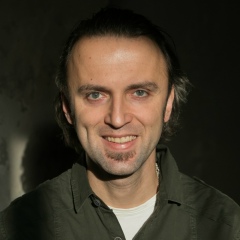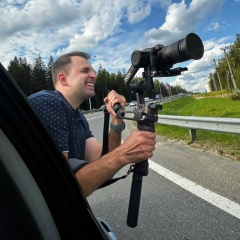Друзья, такой вопрос к вам.
Представьте, вы пришли на защиту дипломных работ в какой-то вуз как оппонент, внешний рецензент или, как это сейчас требуется, представитель потенциального работодателя... И видите как старательный, аккуратный мальчик или старательная, аккуратная девочка защищает работу... "Парижское купечество и боярство в борьбе за великокняжескую власть во Франции XIV века"... или допустим что-то по физике про теорию эфира или... скажем, "Роль того, что предки жирафов тянулись за верхними листьями и растянули тем самым свои шейные позвонки механически в эволюции вида".
Вы спрашиваете, что за хрень? Вы тут совсем е***сь??? А научный руководитель встает и говорит - мол, постойте, не судите строго. Мы просто не хотели затрагивать еще детей боярских, понимаем, что надо было, но слишком тема широкая получается. Или мы понимаем, что не раскрыта роль эфира для ядерного синтеза, но не было времени. Или мы решили сосредоточится только на механических изменениях в ходе эволюции.
Вы... открываете закрываете рот и понимаете, что ребенок за свои или государственные деньги получил вот это в научные руководители. То есть он выполнял все задания от научного руководителя, он правил текст, он доверял учителю. Просто учитель считает, что во Франции были Великие Князья. Более того, эта тема стоит среди УТВЕРЖДЕННЫХ тем в официальном списке за подписью начальства.
Что бы вы сделали в такой ситуации с оценкой студента? Варианты про руководителей не предлагать - это отдельный вопрос.
Что вы сделали бы по отношению к учащемуся? Ведь, с одной стороны он не виноват в том, что ему дали таких учителей, ем требуется мужество чтобы пойти против деканата, списка тем, научного руководителя, а никто не обязан быть героем. С другой - есть книги, интернет, да и вообще, даже если бы их не было - он же станет зоологом, учителем истории, ядерным физиком, археологом. И будет нести эту чушь дальше!
Этот вопрос напрямую касается нашего восприятия образования и оценок - что мы оцениваем - старание или реальный результат? Мы отчитываемся о своей работе или удостоверяем молодого специалиста?
Представьте, вы пришли на защиту дипломных работ в какой-то вуз как оппонент, внешний рецензент или, как это сейчас требуется, представитель потенциального работодателя... И видите как старательный, аккуратный мальчик или старательная, аккуратная девочка защищает работу... "Парижское купечество и боярство в борьбе за великокняжескую власть во Франции XIV века"... или допустим что-то по физике про теорию эфира или... скажем, "Роль того, что предки жирафов тянулись за верхними листьями и растянули тем самым свои шейные позвонки механически в эволюции вида".
Вы спрашиваете, что за хрень? Вы тут совсем е***сь??? А научный руководитель встает и говорит - мол, постойте, не судите строго. Мы просто не хотели затрагивать еще детей боярских, понимаем, что надо было, но слишком тема широкая получается. Или мы понимаем, что не раскрыта роль эфира для ядерного синтеза, но не было времени. Или мы решили сосредоточится только на механических изменениях в ходе эволюции.
Вы... открываете закрываете рот и понимаете, что ребенок за свои или государственные деньги получил вот это в научные руководители. То есть он выполнял все задания от научного руководителя, он правил текст, он доверял учителю. Просто учитель считает, что во Франции были Великие Князья. Более того, эта тема стоит среди УТВЕРЖДЕННЫХ тем в официальном списке за подписью начальства.
Что бы вы сделали в такой ситуации с оценкой студента? Варианты про руководителей не предлагать - это отдельный вопрос.
Что вы сделали бы по отношению к учащемуся? Ведь, с одной стороны он не виноват в том, что ему дали таких учителей, ем требуется мужество чтобы пойти против деканата, списка тем, научного руководителя, а никто не обязан быть героем. С другой - есть книги, интернет, да и вообще, даже если бы их не было - он же станет зоологом, учителем истории, ядерным физиком, археологом. И будет нести эту чушь дальше!
Этот вопрос напрямую касается нашего восприятия образования и оценок - что мы оцениваем - старание или реальный результат? Мы отчитываемся о своей работе или удостоверяем молодого специалиста?
Friends, such a question for you.
Imagine that you came to the defense of a thesis at some university as an opponent, an external reviewer, or, as it is now required, a representative of a potential employer ... And you see how a diligent, neat boy or a diligent, neat girl defends work ... "Paris merchants and boyars in the struggle for great princely power in France of the fourteenth century "... or let's say something in physics about the ether theory or ... say," The role of the fact that the ancestors of the giraffes stretched behind the upper leaves and thereby stretched their cervical vertebrae mechanically in the evolution of the species. "
You ask what kind of crap? Are you absolutely f *** here ??? And the supervisor gets up and says - wait, do not judge strictly. We simply did not want to touch upon the children of the boyars, we understand what was needed, but the topic is too broad. Or we understand that the role of ether for nuclear fusion was not disclosed, but there was no time. Or we decided to focus only on mechanical changes during evolution.
You ... open your mouth and understand that the child for his own or state money got this to the supervisors. That is, he performed all the tasks from the supervisor, he ruled the text, he trusted the teacher. Just the teacher believes that in France there were Great Princes. Moreover, this topic is among the APPROVED topics on the official list, signed by the authorities.
What would you do in such a situation with student assessment? Do not offer options about managers - this is a separate issue.
What would you do with a student? Indeed, on the one hand, he is not to blame for the fact that he was given such teachers, it takes courage to go against the dean’s office, the list of topics, the supervisor, and no one is obliged to be a hero. On the other hand, there are books, the Internet, and indeed, even if they were not there, he would become a zoologist, history teacher, nuclear physicist, and archaeologist. And will carry this nonsense on!
This question directly relates to our perceptions of education and assessments - what do we evaluate - diligence or real result? Do we report on our work or certify a young specialist?
Imagine that you came to the defense of a thesis at some university as an opponent, an external reviewer, or, as it is now required, a representative of a potential employer ... And you see how a diligent, neat boy or a diligent, neat girl defends work ... "Paris merchants and boyars in the struggle for great princely power in France of the fourteenth century "... or let's say something in physics about the ether theory or ... say," The role of the fact that the ancestors of the giraffes stretched behind the upper leaves and thereby stretched their cervical vertebrae mechanically in the evolution of the species. "
You ask what kind of crap? Are you absolutely f *** here ??? And the supervisor gets up and says - wait, do not judge strictly. We simply did not want to touch upon the children of the boyars, we understand what was needed, but the topic is too broad. Or we understand that the role of ether for nuclear fusion was not disclosed, but there was no time. Or we decided to focus only on mechanical changes during evolution.
You ... open your mouth and understand that the child for his own or state money got this to the supervisors. That is, he performed all the tasks from the supervisor, he ruled the text, he trusted the teacher. Just the teacher believes that in France there were Great Princes. Moreover, this topic is among the APPROVED topics on the official list, signed by the authorities.
What would you do in such a situation with student assessment? Do not offer options about managers - this is a separate issue.
What would you do with a student? Indeed, on the one hand, he is not to blame for the fact that he was given such teachers, it takes courage to go against the dean’s office, the list of topics, the supervisor, and no one is obliged to be a hero. On the other hand, there are books, the Internet, and indeed, even if they were not there, he would become a zoologist, history teacher, nuclear physicist, and archaeologist. And will carry this nonsense on!
This question directly relates to our perceptions of education and assessments - what do we evaluate - diligence or real result? Do we report on our work or certify a young specialist?

У записи 5 лайков,
2 репостов,
784 просмотров.
2 репостов,
784 просмотров.
Эту запись оставил(а) на своей стене Константин Крылов

























